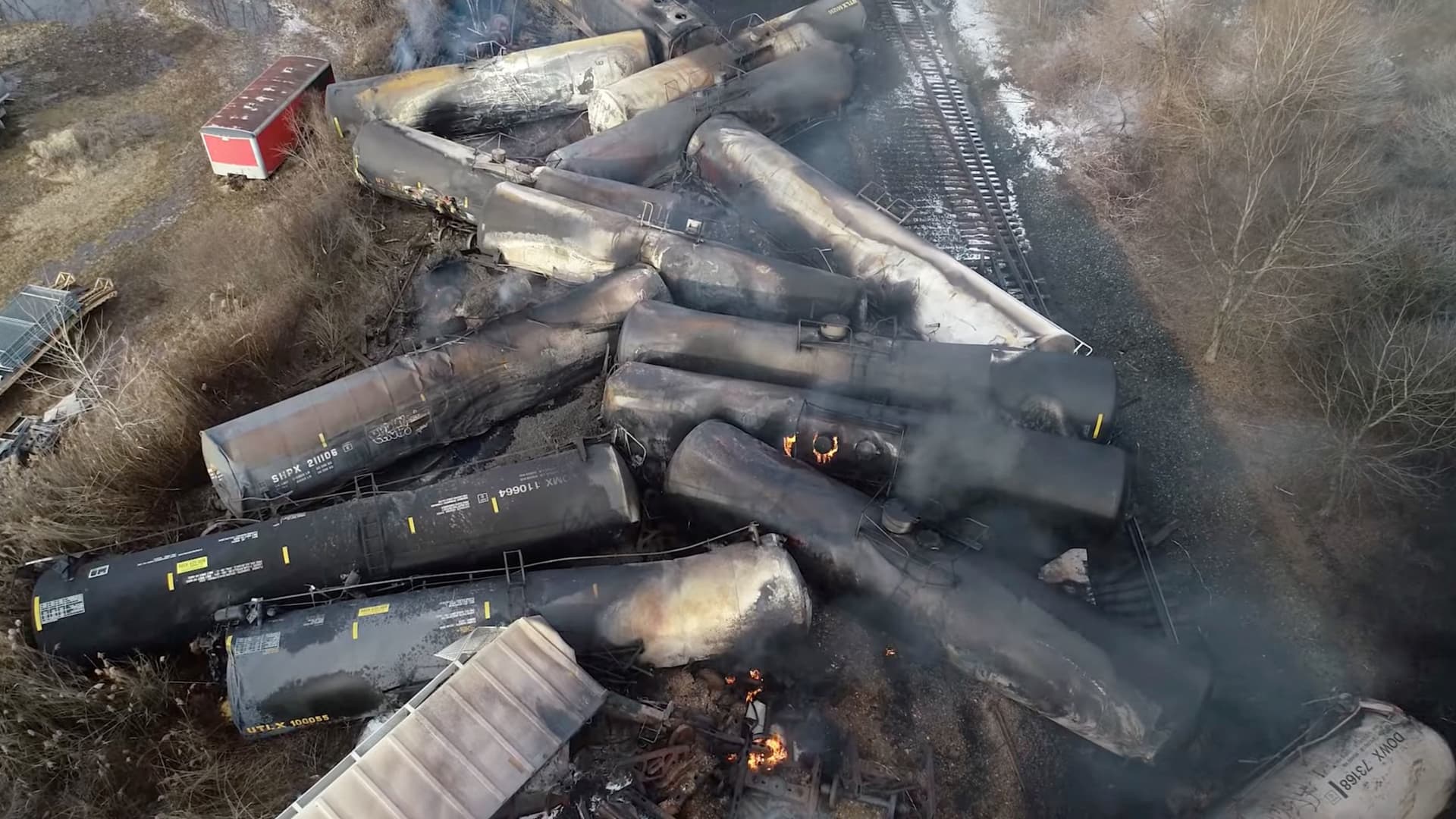
- One year after the East Palestine, Ohio train derailment created an environmental disaster, the Biden administration unveiled new regulations intended to shore up freight rail safety.
- The new rule requiring two person crews on large trains closes a loophole that allowed railroads to keep operating one-person crews.
- But the rule stops short of the kind of rail safety innovations that the Biden administration and members of Congress had originally envisioned in response to East Palestine.
- Making any major updates to rail safety will require congressional funding that the freight industry opposes.
One year after the East Palestine, Ohio train derailment created an environmental disaster, the Biden administration on Tuesday unveiled new regulations intended to shore up freight rail safety.
A new rule finalized by the Federal Railroad Administration will require freight trains in the United States to operate with at least two crewmembers in most circumstances.
The government previously instituted a two-person crew requirement, but a loophole allowed railroads to keep operating one-person crews without performing a rigorous risk assessment or notifying regulators.
"Common sense tells us that large freight trains, some of which can be over three miles long, should have at least two crew members on board - and now there's a federal regulation in place to ensure trains are safely staffed," Transportation Secretary Pete Buttigieg said in a statement Tuesday.
The United States averages at least one train derailment every day. In 2023, there were seven rail-related employee deaths, said Buttigieg. He said the new rule will make railroads safer and prevent worker injuries and fatigue.
Get Tri-state area news delivered to your inbox.> Sign up for NBC New York's News Headlines newsletter.

Yet the new rule stops short of the kind of rail safety updates that the Biden administration and members of Congress had originally envisioned as a response to the East Palestine disaster.
Money Report
The Feb. 3, 2023 Norfolk Southern train crash ignited hundreds of thousands of gallons of dangerous chemicals in a massive fire that burned for two days.
Making any major updates to rail safety will require congressional funding that has not yet been approved.
Buttigieg and union leaders pleaded for Congress to pass the Railway Safety Act Tuesday, and give the federal government more targeted authority and money to enhance safety procedures for trains carrying hazardous materials. The bipartisan measure is stalled in the Senate.
"Congress has yet to act, even a year after the East Palestine derailment in Ohio," said Vince Verna, the vice president and national legislative representative at The Brotherhood of Locomotive Engineers and Trainmen. "Legislating is your job. Please do your job, or get out of the way and let somebody who's willing to step up and do the job do it."
The stalling of the Railway Safety Act also underscores the power of the freight rail industry's Washington lobbying shop, the Association of American Railroads (AAR).
In 2023, the trade association spent $4.4 million lobbying Congress, according to data from the nonprofit Open Secrets. The bill that received more lobbying activity than any other was the Railway Safety Act.
CNBC reached out to CSX, Union Pacific and Norfolk Southern, three of the nation's largest railroads, for comment on the new regulation. All three referred CNBC to the AAR.
"This rule is unsupported by data and lacks a safety justification. Look no further than the DOT's own release, which cites 'common sense' as their justification for the rule," said a spokesperson for the AAR.
The AAR said railroads have devoted billions of dollars to improve safety and that the overall train accident rate is down 27% since 2000, while casualties for Class I railroad employees have dropped 63% during the same period.
Additionally, all Class I railroads, those with the highest operating revenues, currently run with two people, according to the ARA spokesperson.
The Transportation Department says the new regulation will close an existing loophole in the crew requirements by establishing a standards and oversight process that will force railroads to get a prior approval before they can operate a one crewman train.
Buttigieg said that from now on, exemptions to the two-person crew requirement will be the exception, not the rule.
"With this rule, we will allow special approval if and only if a requesting railroad can show to us that their circumstances mean a one person crew will be no less safe," said Buttigieg.






